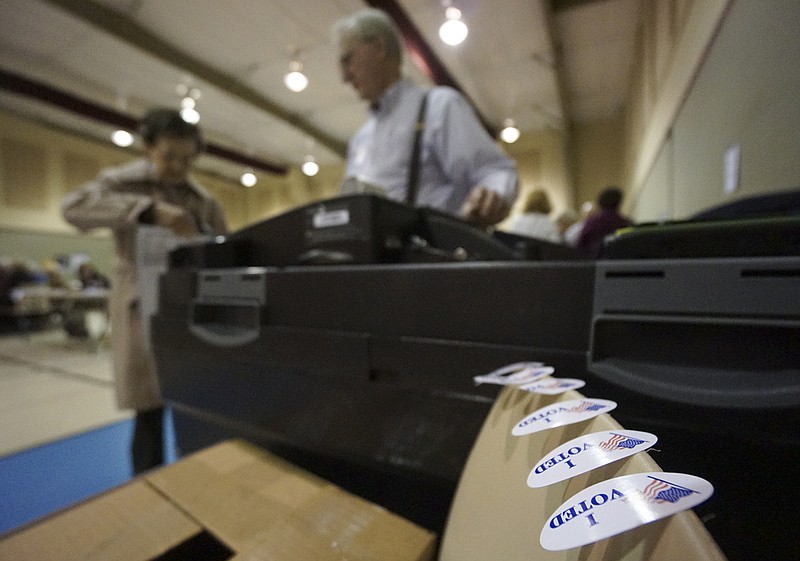Are you registered
You may register at the Hamilton County Election Commission at 700 River Terminal Road in Chattanooga or download an application and drop it off there, or make sure it’s postmarked before Tuesday.
Tuesday is the deadline in Tennessee and Georgia for registering to vote if you want to cast a ballot in this year's presidential election. In Alabama, the deadline is Oct. 24.
But if you haven't voted in the last few years, you may want to make sure you haven't been purged from the rolls of eligible voters in your county and state.
Why? Because of tightening voter registration laws and systems.
In Tennessee, for instance, if a voter fails to participate over the course of two November election cycles, he or she is placed on a list of inactive voters not included in the commission's tally of eligible voters. After two more November cycles of non-participation, the voter is "purged," and must re-register.
But another and potentially more mistake-prone way voters might be being purged is the Interstate Voter Registration Crosscheck Program. The crosscheck program, initiated in Kansas in 2005, has 29 member states - all Republican states and including Tennessee and Georgia. The stated purpose of the program is to identify possible duplicate registrations among states.
But the program came under fire in August with a story in Rolling Stone headlined "The GOP's Stealth War Against Voters." The story says the crosscheck "disproportionately threatens solid Democratic constituencies: young, black, Hispanic and Asian-American voters."
The writer of the article, Greg Palast, specializes in voter registration reporting, and he calls the system, "the new Jim Crow since the end of the Voting Rights Act."
Palast says he obtained the current list of potential "double voters" - determined by duplicate names - and it contains 7.2 million names set to be removed from voting rolls. He offers this example: There are 288 James Browns who supposedly voted twice in Georgia and another state. Further, purging the names on this overall list, he says, would eliminate one in seven black voters. The list is also heavy with Hispanic and Asian names. Palast questions why only four people have been charged with double voting.
Hamilton County election officials counter that the Rolling Stone article is not an accurate representation of how the Interstate Crosscheck Voter Registration Program works in Tennessee. Here, they say, voters' names, dates of birth and the last four digits of their Social Security number must match before a purge is made.
The Center for Public Integrity in August also highlighted Georgia with a report that begins like this: "The cleansing of America's voter registration rolls occurs every two years and has become a legal battleground between politicians who say the purges are fair and necessary, and voting rights advocates who contend that they discriminate."
Imagine - and hope you're wrong - that you go to the polls to vote on Nov. 8 and are told when you sign in that you are no longer registered or you are turned away because your drivers license name or address doesn't match voting records. The pollworkers can give you a "provisional" ballot, but you'll have to show up at the election commission office within two days to prove yourself. In Tennessee's November 2012 elections, only 1,623 of the 7,097 paper provisional ballots cast were counted, according to state election officials. That means about four out of five were tossed out.
The door opened for these and other voter restriction efforts when the Supreme Court in 2013 gutted the Voting Rights Act, freeing states to impose new rules in the name of virtually non-existent voter fraud.
In all, at least 17 states put new voting procedures in place. Some, like Tennessee, required strict photo IDs. Others limited ballot box access across many miles and eliminated early voting or same-day voter registration. By the spring of this year, more than half of those states' new limits had been challenged in various courts around the country, and in recent weeks, federal appeals courts have knocked down at least some of the new barriers in North Carolina, Texas, Wisconsin, Kansas and North Dakota.
Just over a week ago, a federal appeals court ruled Ohio's voter purge" of thousands of inactive voters unconstitutional. Ohio's rule removed any voter from the rolls who had not voted in six years.
Tennessee's participation in the Crosscheck program, combined with our strict voter ID law - requiring our voting information to perfectly match our drivers license or other government photo identification cards, makes it easy to understand how the Volunteer State is considered the ninth most difficult in which to cast a ballot.
We should be making voting rights more practiced and truly voter-friendly. But our current majority Republican state knows that GOP candidates are favored when there is lower voter turnout - and when that turnout is older and whiter.
From March 1 just before the presidential primaries this year until Thursday, Hamilton County purged 3,729 voters, according to Hamilton County Election Commission's Administrator of Elections Kerry Steelman. The breakdown looked like this: 1,276 for death, 88 for duplicate registration, 70 for felony convictions and 2,295 because they moved out of the county.
On the upside, our growing county saw 10,937 new registrations in that same few months.
Nonetheless, for the first time in more than two decades, voter participation in Hamilton County's August elections dropped to an all-time low of 15.6 percent. In a county with more than 336,000 residents and 186,384 eligible voters, only 29,100 ballots were cast.
And we wonder why.
